Learning Units
-
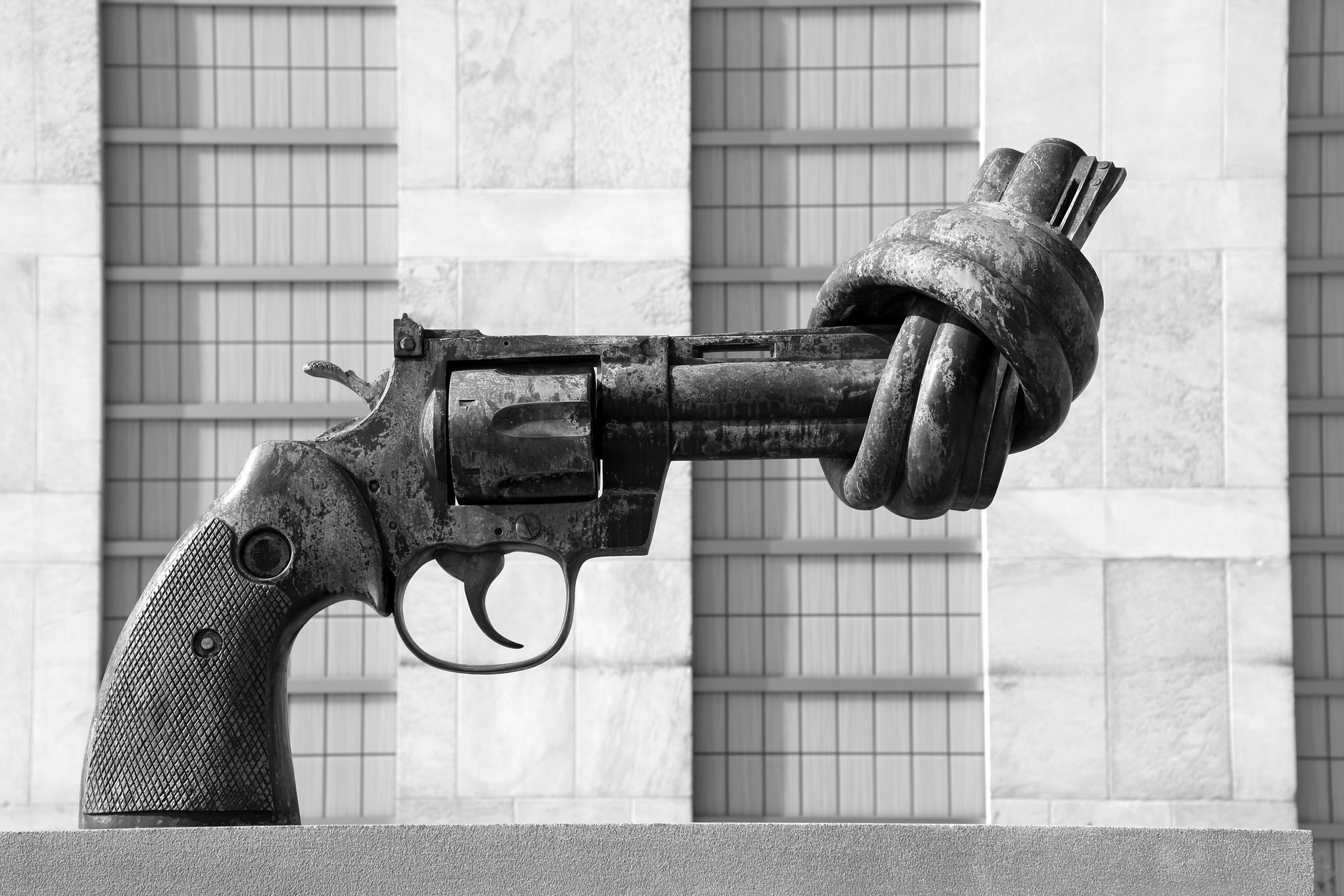
01 Arms Control Basics
For several decades, arms control, non-proliferation and disarmament have played a key role in many states’ security and foreign policies. This learning unit provides a general introduction to the ...
LU 01: Arms Control Basics
For several decades, arms control, non-proliferation and disarmament have played a key role in many states’ security and foreign policies. This learning unit provides a general introduction to the field and explains how arms control can help to promote international peace and security.
This learning unit aims to provide you with a basic understanding of arms control and explains how it can help to promote international peace and security. You will learn the core objectives of arms control and how the concepts of sarms control relate to non-proliferation, disarmament, humanitarian arms control and other critical approaches. After completing this learning unit, you will also understand what types of weapons exist, how exactly these can be regulated by arms control, and what the factors of success are. Lastly, you will learn why verification is a crucial component of arms control and what the future of arms control might hold.
Authors
Frank Kuhn
Frank Kuhn is a Doctoral Researcher at Peace Research Institute Frankfurt (PRIF), Germany. His research interests include arms control and nonproliferation, nuclear deterrence, military technology, and military strategy. In his dissertation, he explores the motives of high-level U.S. decisionmakers to engage in strategic arms reductions talks with the Soviet Union and Russia. Frank Kuhn is also the Project Coordinator for the Cluster for Natural and Technical Science Arms Control Research (CNTR) at PRIF, which analyzes emerging technologies and developments in the natural and technical sciences from an interdisciplinary perspective. He holds an M.A. in International Studies/Peace and Conflict Studies from Goethe University Frankfurt and Technical University Darmstadt, Germany, and a B.A. in Political Science, also from Goethe University Frankfurt. Frank Kuhn is member of the Young Deep Cuts Commission and a 2025 Nuclear Scholar of the Project on Nuclear Issues (PONI) at the Center for Strategic and International Studies (CSIS) in Washington, D.C.
Christopher Daase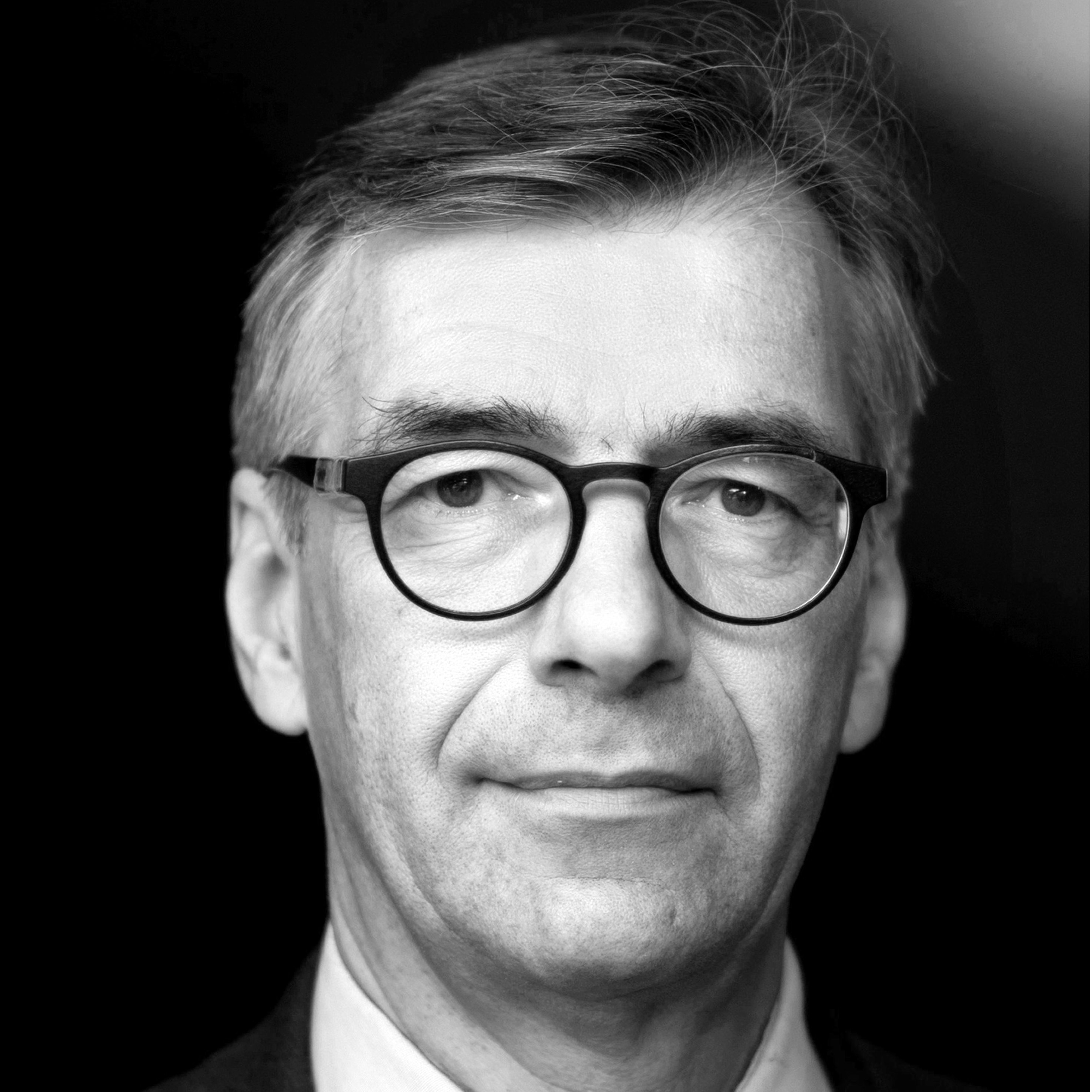
Christopher Daase is Professor of International Relations at Goethe University Frankfurt, Germany, and Deputy Director of the Peace Research Institute Frankfurt (PRIF) where he heads the research department on “International Security”. His research and teaching focuses on security policy (especially wars and civil wars, terrorism and radicalization, non-proliferation and arms control) as well as international institutions. Dr. Daase studied political science, literature, philosophy and art history in Hamburg, Freiburg and Berlin and conducted doctoral research as a SSRC-MacArthur Fellow in International Peace and Security at Harvard University and the RAND Corporation. In 1996 he received his doctorate from the FU Berlin with a thesis on unconventional warfare. He is co-founder of the Arms Control Negotiation Academy (ACONA), and member of the Executive Board of the EU Non-Proliferation and Disarmament Consortium. Dr. Daase has published several books and numerous articles in international journals and was editor of the leading German international relations journal for more than ten years. Since 2022 he is member of the Advisory Board on Education and Outreach of the Organisation for the Prohibition of Chemical Weapons (OPCW).

02 Chemical Weapons
Modern chemical weapons (CW) were first used on a large scale in 1915 and became a prominent feature in the battles of World War I. Chemical weapons were the product of scientific advances, ...
LU 02: Chemical Weapons
Modern chemical weapons (CW) were first used on a large scale in 1915 and became a prominent feature in the battles of World War I. Chemical weapons were the product of scientific advances, technological developments and industrialisation. The efforts to prohibit their use in war began as early as 1899 but accelerated after the Armistice of 1918. Today, the 1993 Chemical Weapons Convention (CWC) is the strongest ban on CW development, production, stockpiling and use in force. However, since the mid-1990s, new ways of using toxic agents have emerged, including in terrorism, crime and assassination operations. From 2013 on, chemical warfare also returned to the forefront in the Syrian civil war, with CW use attributed to government military forces and the Islamic State in Iraq and the Levant (ISIL). Although all CW declared under the CWC have now been destroyed, the problem of CW has not completely disappeared. New scientific and technological developments challenge the prohibition because they may allow new types of toxic agents, production methods or dissemination methods, in which new categories of actors may acquire an interest. This learning unit introduces you to the history of CW use, the different types of agents, and the efforts to outlaw their manufacture, possession and use under any circumstances. It also discusses the various challenges to the norm against CW and the efforts to strengthen that norm in view of evolving threats and challenges.
After completing this learning unit, the student will:
- understand the nature of chemical weapons (CW) and their effects on humans, animals and the environment
- understand the technical foundations of CW
- be familiar with the Chemical Weapons Convention (CWC) and other relevant international treaties
- understand the current nature of the CW challenge, including
- the evolution of the CW concept
- dual-use issues relating to civilian research, development and production activities
- legitimate and illegitimate uses of irritants (e.g. riot control agents)
- terrorism
- chemical security and safety
- have a detailed background on
-
- CW use in Syria and the international response to a major violation of the norm against CW
-
- CW use in terrorism and assassination operations
-
- the opportunistic use of industrial toxic chemicals (ITCs) and commercially available toxic products
- have an overview of EU policies in support of the CWC and the norm against CW
Author
Jean Pascal Zanders
Dr Jean Pascal Zanders (Belgium) is an independent researcher/consultant on disarmament and security questions. He heads The Trench, a research initiative dedicated to the future of disarmament. He is also a non-resident Senior Research Associate at the Fondation pour la Recherche Stratégique (Paris). He holds Master’s Degrees in Germanic Philology-Linguistics (1980) and Political Sciences (1992) and a PhD Degree in Political Sciences (1996) from the Free University of Brussels. He was Project Leader of the Chemical and Biological Warfare Project at the Stockholm International Peace Research Institute (1996–2003), Director of the Geneva-based BioWeapons Prevention Project (2003–08) and Senior Research Fellow at the European Union Institute for Security Studies (2008–13). He has participated as an expert to the Belgian and EU Delegations in the BTWC and CWC meetings since 2009. From January 2016 until December 2019, he chaired the Advisory Board on Education and Outreach (ABEO) of the Organisation for the Prohibition of Chemical Weapons (OPCW) and remained a member until December 2021.

03 Biological Weapons
The Ebola crisis in West Africa (2014–2016) and especially the Corona pandemic in the early 2020s reminded us of the challenge to contain and manage pandemic diseases in a globalised and ...
LU 03: Biological Weapons
The Ebola crisis in West Africa (2014–2016) and especially the Corona pandemic in the early 2020s reminded us of the challenge to contain and manage pandemic diseases in a globalised and interconnected world. Although the Ebola outbreak was a naturally occurring epidemic, terrorist organisations or states could create ‘man-made’ pandemics in the form of biological weapons (BW) in the future.
This learning unit addresses the challenges to prevent acts of biowarfare and bioterrorism in an era of rapid advances and diffusion of sensitive biotechnologies.
After completing this learning unit, you will:
- understand the technical foundations of BW
- have an overview of historical BW programmes
- comprehend the nature of bioterrorism
- be familiar with the political context of biological weapons
- have better knowledge of the international legal framework aimed at prohibiting the possession and use of BW
Author
Filippa Lentzos
Dr Filippa Lentzos is Reader (Associate Professor) in Science & International Security at King’s College London, with a joint appointment in the Department of War Studies and in the Department of Global Health & Social Medicine. She is also an Associate Senior Researcher at the Stockholm International Peace Research Institute (SIPRI) in Sweden and a Non-Resident Scholar at the James Martin Center for Nonproliferation Studies (CNS) in the United States. Lentzos serves as the NGO Coordinator for the Biological Weapons Convention. She is a member of the UK Biosecurity Leadership Council and of the WHO Health Security Interface Technical Advisory Group (HSI-TAG). She also serves as an adviser and mentor on the Young Women in Non-Proliferation and Disarmament mentorship programme, and as an advisory board member at the Vienna Center for Disarmament and Non-Proliferation (VCDNP) in Austria. A biologist and social scientist by training, Lentzos has researched and been actively involved in biological disarmament and non-proliferation for over two decades. For more about her work, see www.filippalentzos.com

04 Nuclear Weapons I
This learning unit examines the technical foundations of nuclear weapons, including fission and fusion processes, weapon designs, and the nuclear fuel cycle. It also explores disarmament ...
LU 04: Nuclear Weapons I
This learning unit examines the technical foundations of nuclear weapons, including fission and fusion processes, weapon designs, and the nuclear fuel cycle. It also explores disarmament challenges, verification methods, and the role of monitoring technologies in ensuring compliance with international non-proliferation agreements.
After completing this learning unit, you will:
- understand the basic physics behind nuclear weapons
- understand the basic differences between different nuclear weapons designs
- grasp the dual use dimension of the nuclear fuel cycle
- know the effects of nuclear weapons
- have an overview of global stockpiles of nuclear weapons and materials
- understand the rationale for nuclear testing
- comprehend the basic technical challenges of disarmament
- understand the challenges of and technical measures used for the verification of disarmament initiatives
Authors
Cecilia Gustavsson
Cecilia Gustavsson is an associate professor in Applied Nuclear physics at Uppsala University with a background in experimental nuclear physics. She is currently a member of the working group on Technical Verification and Monitoring at the Alva Myrdal Centre for Nuclear Disarmament.
Débora Trombetta
Débora Trombetta is a researcher at the Department of Applied Nuclear Physics from Uppsala University, in Sweden. Débora has a PhD in applied nuclear physics and her background is in Nuclear Nonproliferation. Débora also performed research in the area of nuclear disarmament verification under the working group on Technical Verification and Monitoring from the Alva Myrdal Centre for Nuclear Disarmament.

05 Nuclear Weapons II
The Nuclear Non-proliferation Treaty (NPT) is the single most important treaty covering nuclear non-proliferation and disarmament. This learning unit introduces the NPT and discusses its political,...
LU 05: Nuclear Weapons II
The Nuclear Non-proliferation Treaty (NPT) is the single most important treaty covering nuclear non-proliferation and disarmament. This learning unit introduces the NPT and discusses its political, legal and historical dimensions.
After completing this unit, you will:
- understand the origins of the nuclear bomb, the nuclear arms race, the need for nuclear non-proliferation and arms control, and have a grasp of the process leading to the NPT and its rationale;
- know the basic requirements and undertakings of the three pillars of the NPT:
- Nuclear non-proliferation
- Peaceful uses of nuclear energy
- Nuclear disarmament;
- understand the structure and role of the International Atomic Energy Agency (IAEA) and the functioning of its safeguard system;
- understand the difficulties in implementing the disarmament pillar and the divergent interests between nuclear weapon states (NWS) and non-nuclear weapon states;
- have an overview of the peaceful uses of the nuclear energy pillar;
- understand the civilian applications of nuclear energy and the new developments in the sector;
- understand the main provisions of the Treaty on the Non-Proliferation of Nuclear Weapons (NPT): nuclear sharing, implementation of safeguards, compliance, enforcement, transparency, universality, nuclear-weapon-free zones (NWFZ), and its relationship to the Treaty on the Prohibition of Nuclear Weapons (TPNW);
- have a clear idea of the rationale and process of the NPT review cycle and its evolution since 1995;
- understand the issue of NPT withdrawal, its controversies and its process; and
- grasp the role of the EU in the NPT framework, its milestones and challenges
Authors
Manuel Herrera
Dr Manuel Herrera is a Senior Policy Fellow at BASIC, the Programme Manager of the Non-Proliferation and Disarmament Programme, and the Project Manager of the Nuclear Non-Proliferation Treaty (NPT) Monitor project. Manuel conducts research in the field of non-proliferation and disarmament, with a specific expertise on the Iranian nuclear programme and nuclear diplomacy in the context of the NPT. Previously, Manuel was Research Fellow in the Multilateralism and Global Governance programme at the Istituto Affari Internazionali (IAI, Rome), where he co-managed IAI’s activities within the EU Non-Proliferation and Disarmament Consortium (EUNPDC). He was also a research assistant in the nuclear security programme at the Institute of Peace and Conflict Studies, New Delhi, India; worked at the Office of Geopolitical Analysis of the Spanish Ministry of Defence; and was an EUNPDC intern within the “Next Generation” programme at the Institute for Foreign and International Policy (INCIPE) in Madrid. Finally, Manuel was a non-doctoral fellow at the Centre for International Studies in Lisbon, and a visiting researcher at the Peace Research Institute Frankfurt. He holds a Master’s degree in International Security from the Institute of International Studies of Barcelona (IBEI) and a PhD from the King Juan Carlos University of Madrid in the Social and Legal Sciences programme, specialising in Public International Law and International Relations.
Ottavia Credi
Ottavia Credi was a Researcher in IAI’s Defence and Security Programmes. She specialises in international security, European and transatlantic defence, disarmament and non-proliferation. Formerly, Ottavia worked at the European Parliament in Brussels and at the American Security Project in Washington DC. Ottavia holds a Bachelor of Arts in International Studies from the University of Trento and a Master of Arts in Intelligence & International Security from King’s College London’s War Studies Department. She currently works as a consultant on EU policies.

06 WMD-free Zones
While the world wrestles with the idea of a world free of nuclear weapons, some regions are already a step ahead. The whole southern hemisphere is a nuclear weapon-free zone (NWFZ) and also in the ...
LU 06: WMD-free Zones
While the world wrestles with the idea of a world free of nuclear weapons, some regions are already a step ahead. The whole southern hemisphere is a nuclear weapon-free zone (NWFZ) and also in the northern hemisphere such zones are being created. This learning unit focusses on NWFZ and the idea of broadening such zones both geographically and in relation to other weapons of mass destruction.
After completing this unit, the student will:
- understand the concept of NWFZ and WMDFZ
- comprehend the legal basis and the structure of these zones
- have an overview of the history of their development
- know the rationale of their establishment
- have an overview of the role of external actors and the negative security assurances that nuclear weapon states are expected to provide
- be capable of assessing the EU’s position on NWFZ in general and the Middle East WMDFZ in particular
Authors
Erzsébet Rózsa
Erzsébet N. Rózsa (born 1959) has an MA in Arabic Studies, Iranian Studies as well as English Studies. She holds a PhD in International Relations (1996). She is a Professor at the University of Public Service, Budapest and is an Academic Advisor at the Institute for World Economics of the Center for Economic and Regional Studies. She is also an External Fellow at the Institute of Foreign Affairs and Trade. Her fields of research include the political, security and social processes of the Middle East, Egypt, Iran, the Iranian nuclear debate, nuclear non-proliferation, as well as the Euro-Mediterranean cooperation institutions.
Anna Péczeli
Anna Péczeli is a Visiting Research Scholar at The Europe Center at Stanford University, and an adjunct fellow at the Centre for Strategic and Defence Studies (CSDS) in Hungary. Previously, she was a Senior Research Fellow at CSDS, and a Stanton Nuclear Security Fellow at Stanford University’s Center for International Security and Cooperation. Before these positions, she was an assistant lecturer at Corvinus University of Budapest, an adjunct fellow at the Hungarian Institute of International Affairs, a visiting research fellow at the Peace Research Institute Frankfurt, and a visiting Fulbright fellow at the Federation of American Scientists in Washington, DC. She earned a Ph.D. degree in International Relations from Corvinus University of Budapest, and her research focused on the Obama administration’s nuclear strategy.
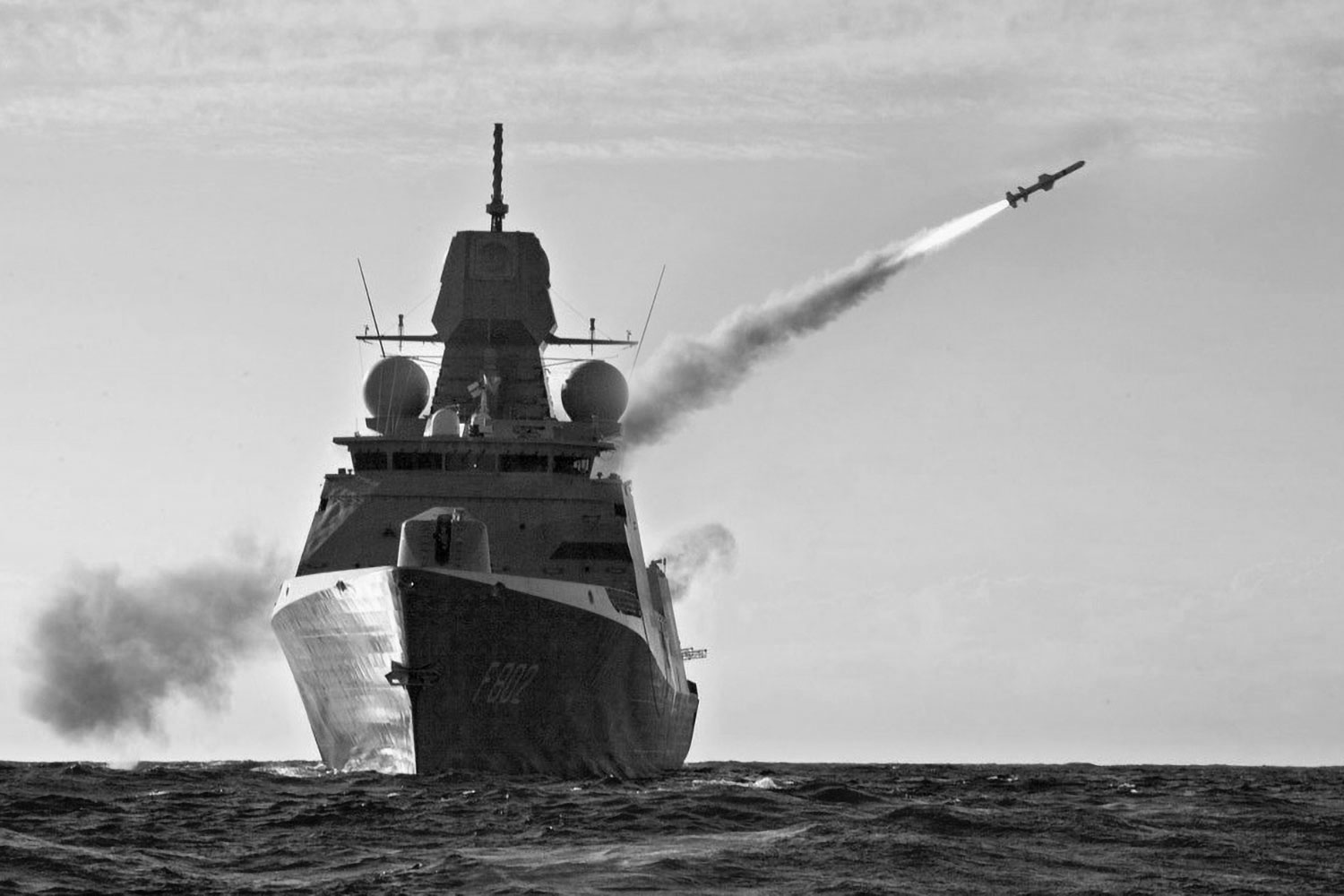
07 Missiles
This unit provides a comprehensive analysis of missile systems, encompassing technical specifications, strategic implications, and political ramifications. It examines proliferation dynamics, ...
LU 07: Missiles
This unit provides a comprehensive analysis of missile systems, encompassing technical specifications, strategic implications, and political ramifications. It examines proliferation dynamics, including dual-use technologies and the evolving landscape of missile development.
This learning unit introduces technical, strategic and political aspects of missiles. It covers:
- a comprehensive technical overview of different missile types, particularly ballistic missiles, boost-glide vehicles, rocket artillery, cruise missiles and long-range one-way attack drones
- strategic issues, including missile procurement, missile proliferation and missile defence
- political concerns, focusing on efforts to restrict both vertical and horizontal proliferation of missiles
- the future of missile proliferation, highlighting the role of dual-use goods and novel industrial actors in missile technology space
Author
Fabian Hoffmann
Fabian Hoffmann is a Doctoral Research Fellow at the Oslo Nuclear Project (ONP) at the University of Oslo. His research focuses on missile technology, nuclear strategy and defence policy. His PhD project addresses the implications of conventional long-range strike weapons on nuclear strategy. Fabian’s research has been published in the Journal of Strategic Studies, European Security, War on the Rocks and The Washington Post, among others. He frequently contributes to the national and international news, providing commentary for both print and broadcast media.

08 Space Security
The learning unit offers a comprehensive exploration of space security, covering risks such as space weather and intentional threats, emphasising the importance of Space Situational Awareness, ...
LU 08: Space Security
The learning unit offers a comprehensive exploration of space security, covering risks such as space weather and intentional threats, emphasising the importance of Space Situational Awareness, governance frameworks and the EU’s role in promoting responsible behaviour. It also examines emerging space partnerships amidst geopolitical tensions, highlighting the need for collaboration in ensuring peaceful space exploration.
The learning unit provides a comprehensive overview of space security, emphasising its indispensable role in modern life and the evolving landscape of space governance. It outlines the diverse risks to space operations, including space weather, debris, interference and intentional threats such as counterspace capabilities and hybrid operations. The importance of Space Situational Awareness (SSA) and Space Domain Awareness (SDA) for monitoring and managing space activities is highlighted. It also features considerations on space governance frameworks and the EU’s role in promoting responsible behaviour. The unit also delves into the emerging competition in space partnerships, exemplified by the Artemis Program and the joint endeavours pursued by China and Russia, underscoring the geopolitical tensions and the need for collaborative efforts to ensure the peaceful and sustainable use of outer space.
Authors
Jana Robinson
Dr Jana Robinson became Managing Director of the Prague Security Studies Institute (PSSI) in April 2020. She also serves as PSSI’s Space Security Program Director, a post she assumed in 2015. She previously held the position of Space Policy Officer at the European External Action Service (EEAS) in Brussels as well as Space Security Advisor to the Czech Foreign Ministry. From 2009 to 2013, Dr Robinson worked at the European Space Policy Institute (ESPI), seconded from the European Space Agency (ESA), leading the Institute’s Space Security Research Programme. Dr Robinson is an elected member of the International Institute of Space Law (IISL) and the International Academy of Astronautics (IAA). She is also a member of the Advisory Board of the George C. Marshall Missile Defense Project of the Center for Strategic and International Studies (CSIS) in Washington, D.C. Dr Robinson holds a PhD in the field of space security from the Charles University’s Faculty of Social Sciences, Institute of Political Studies and received two MA degrees from George Washington University’s Elliott School of International Affairs and Palacky University in Olomouc, respectively.
Kristína Sikoraiová
Kristína Sikoraiová joined the Prague Security Studies Institute in February 2020 and has since contributed her expertise to the Space Security Program. She holds a Master’s degree in International Relations and Diplomacy, with a minor in Managerial Psychology and Sociology, earned at the Prague University of Economics and Business. Her Master’s thesis explored the field of cybersecurity in space, with a specific emphasis on EU–US cooperation. The research Ms Sikoraiová conducted for her undergraduate dissertation centered on how the People’s Republic of China is expanding its global influence through the space sector.
František Avrat
František Avrat is a Project Coordinator supporting the Space Security Program. Mr Avrat holds a bachelor’s degree in China Studies from Masaryk University and a master’s degree in Asia Pacific Studies from National Chengchi University in Taiwan, with a focus on Chinese sharp power in Czech–Sino relations. He also holds the Erasmus Mundus Master’s degree in Intelligence, Security and Strategic Studies. His main area of interest is space security, the role and tactics of the People’s Republic of China in the international system, and emerging disruptive technologies.
Kelig Chappuis
Kelig Chappuis is also a Project Coordinator for PSSI’s Space Security Program. He holds a BSc in Forensic Science and an International Master’s in Security, Intelligence and Strategic Studies. He wrote his master’s thesis on intelligence processes in peacekeeping operations, and specialises in OSINT data management and link analysis. He also served as a special forces communications officer in the Swiss Armed Forces.
Jakub Pražák
Dr Jakub Pražák is a Research Fellow in the PSSI’s Space Security Program, which he joined as a Project Assistant in June 2018. Dr Pražák is the first graduate of the William P. Clark Ph.D. Scholarship in Space Security. His research focused primarily on space threats and offensive counterspace technology. Dr Pražák holds two Master’s degrees in Security Studies and International Relations and a Bachelor’s degree in Political Science and International Relations from Charles University. Before joining PSSI, Dr Pražák was an intern at the Czech Ministry of Defence and at the National Cyber and Information Security Agency.
Patrik Martínek
Patrik Martínek is a Project Coordinator at PSSI, mainly focusing on projects connected with space security. He holds a Bachelor’s degree in International Studies and Diplomacy, and a Master’s degree in International Politics and Diplomacy from the Prague University of Economics and Business. He wrote his Bachelor’s dissertation on current trends in space security, and his Master’s dissertation focused on the topic of space traffic management.
Nico Mastrangelo
Nico Mastrangelo, a student of PPE, is deeply curious about the world around him. In the context of his career, he has since spent time in various industries, including the Theater, Service, Communications, Journalism, and Research sectors. Currently, as a Project Coordinator at the prestigious Prague Security Studies Institute, Nico has had the wonderful privilege of assisting with various projects; while primarily working within the Economic and Financial Statecraft Program, he jumped at the opportunity to harness his previous skill sets to assemble this learning unit. He hopes you learn as much by listening to it, as he did making it!

09 Humanitarian Arms Control I
Anti-personnel landmines and cluster munitions have been banned for their harmful effects on civilians. Treaties such as the Mine Ban Treaty (1997) and the Convention on Cluster Munitions (2008) ...
LU 09: Humanitarian Arms Control I
Anti-personnel landmines and cluster munitions have been banned for their harmful effects on civilians. Treaties such as the Mine Ban Treaty (1997) and the Convention on Cluster Munitions (2008) focus on human security, requiring weapon clearance and victim assistance, and inspiring broader humanitarian disarmament efforts.
After completing the unit you will be able to:
- identify the key features of humanitarian arms control;
- distinguish between traditional arms control and humanitarian arms control;
- apply a humanitarian framework to analyse conflict and emerging weapons issues;
- understand current challenges to the consolidation and strengthening of humanitarian arms control.
Author
Margarita Petrova
Margarita Petrova is an assistant professor at the INSTITUT BARCELONA D'ESTUDIS INTERNACIONALS (IBEI) where she teaches courses in International Relations and International Peace and Security. She holds a PhD degree in Government from Cornell University and her doctoral thesis, "Leadership Competition and the Creation of Norms: A Cross-National Study of Weapons Restrictions," received the 2008 Helen Dwight Reid award for best dissertation in international relations, law and politics from the American Political Science Association. Margarita's main interests are in the area of international norm development, ethical and legal issues in international relations, security studies and arms control, and transnational activism and NGO advocacy.
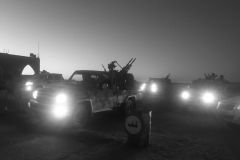
10 Humanitarian Arms Control II
This learning unit aims to enhance understanding of the illicit proliferation of SALW, policy instruments for controlling illicit SALW proliferation and the key challenges that hinder effective ...
LU 10: Humanitarian Arms Control II
This learning unit aims to enhance understanding of the illicit proliferation of SALW, policy instruments for controlling illicit SALW proliferation and the key challenges that hinder effective policy implementation.
After finishing this learning unit you will:
- have a better understanding of the illicit proliferation of SALW
- know the main elements of the most important international policy instruments developed at UN and EU level to control the proliferation of SALW
- have gained knowledge on the objectives, scope and content of the ATT and on the challenges of the development and implementation of policy instruments to combat the illicit proliferation of SALW
Authors
Nils Duquet
Nils Duquet is the Director of the Flemish Peace Institute, an independent research institute affiliated to the Flemish Parliament (Belgium). He started working at the Institute as a researcher in 2006 and has authored more than 70 policy-oriented and academic publications on illicit firearms trafficking and gun violence in Europe, domestic gun policies and European arms export controls. In recent years, he has coordinated several large-scale European research projects on gun violence and arms trafficking in Europe.
Majlinda Behrami
Majlinda Behrami conducts research on gender, small arms control, and women, peace and security. Currently, she is affiliated with the South Eastern and Eastern Europe Clearinghouse for the Control of Small Arms and Light Weapons (SEESAC), analysing the progress in the Western Balkans toward implementing the roadmap for a sustainable solution to arms control. Previously, at the Flemish Peace Institute, she worked on firearms-related gender-based violence in the European Union. Majlinda is part of the third cohort of the Young Women in Non-Proliferation and Disarmament Mentorship Programme, organised within the framework of the EU Non-Proliferation and Disarmament Consortium.
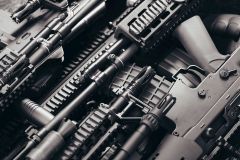
11 Arms Control In Europe
This learning unit will present the history of the development of the European arms control architecture, outline its main components and discuss its gradual unravelling, addressing conventional ...
LU 11: Arms Control In Europe
This learning unit will present the history of the development of the European arms control architecture, outline its main components and discuss its gradual unravelling, addressing conventional and nuclear dimensions. It will also examine the role of the European Union. Lastly, it will discuss the factors which may lead to a return of arms control.
After completing this learning unit, the students will:
- understand the origins, history and the current state of conventional arms control in Europe;
- be able to describe the purpose and functioning of the CFE Treaty, Open Skies Treaty and the Vienna Document;
- learn the difference between strategic and non-strategic nuclear weapons (NSNW);
- understand NATO nuclear sharing and Russia’s approach to NSNW;
- be familiar with the challenges of bringing NSNW under an arms control/confidence-building framework;
- understand the role played the EU and other organisations in the European arms control system;
- grasp the main challenges to arms control in Europe, including the effects of Russia’s war on Ukraine, as well as conditions for a potential return to European arms control.
Authors
Łukasz Kulesa
Łukasz Kulesa is Director of Proliferation and Nuclear Policy at the Royal United Services Institute (RUSI). His research interests include nuclear and conventional deterrence, arms control, Euro-Atlantic security, non-proliferation of weapons of mass destruction and the transatlantic security relationship. balPrior to joining RUSI, Łukasz was Deputy Head of Research Office at the Polish Institute of International Affairs (Warsaw). He also worked as Research Director at the European Leadership Network (ELN). He holds a master’s degree in international relations and European studies from the Central European University and is a graduate of the law department of the Jagiellonian University.
Linde Desmaele
Linde Desmaele is an Assistant Professor of Intelligence and Security at the Institute of Security and Global Affairs (ISGA) at Leiden University. She is also a Senior Associate Researcher at the Centre for Security, Diplomacy and Strategy (CSDS) at the Brussels School of Governance. Linde’s work is situated at the intersection of international relations and security studies, with a focus on nuclear politics, US alliances and European security. Before joining Leiden University, she held fellowships at MIT and Columbia University. She holds a PhD from the Vrije Universiteit Brussel, where her dissertation earned her the 2022 Global Strategy PhD Prize.

12 Export Controls
This learning unit aims to enhance understanding of the illicit proliferation of SALW, policy instruments for controlling illicit SALW proliferation and the key challenges that hinder effective ...
LU 12: Export Controls
This learning unit aims to enhance understanding of the illicit proliferation of SALW, policy instruments for controlling illicit SALW proliferation and the key challenges that hinder effective policy implementation.
In this learning unit
- you will be introduced to the rationale behind arms and dual-use export controls, and to what these controls cover.
- you will be introduced to the scope, actors and main elements of a national export control system.
- you will be introduced to the multilateral instruments which provide standards for export controls, and how these have developed over time.
- you will learn about the arms and dual-use export control instruments developed by and through the European Union (EU).
- you will learn how arms and dual-use export controls are implemented at the national level.
- you will learn about the current challenges associated with the implementation of arms and dual-use export controls, and how these challenges are being addressed.
Authors
Lauriane Héau
Lauriane Héau (France) is a Researcher with SIPRI’s Dual-Use and Arms Trade Control Programme. As part of her work, she follows developments within the main instruments and regulations established to regulate the arms and dual-use trade at the national, european and international levels. Her recent work focused on the MTCR, the impact of NewSpace, and intangible transfers of technology. She also conducts research on mitigating arms diversion risks, and follows developments within the Arms Trade Treaty.
Giovanna Maletta
Giovanna Maletta (Italy) is a Senior Researcher with SIPRI’s Dual-Use and Arms Trade Control Programme. Her research work at SIPRI examines issues related to the implementation of national, multilateral and international export control standards and instruments, with a particular focus on EU engagement with arms export policies and the ATT. Giovanna’s work also involves mapping cooperation and assistance activities in the field of arms transfer and SALW controls.
Kolja Brockmann
Kolja Brockmann (Germany) is an independent consultant and a Senior Researcher (non-resident) with SIPRI’s Dual-Use and Arms Trade Control Programme. His recent work has focused on the multilateral export control regimes, post-shipment controls, and non-proliferation and export control challenges linked to additive manufacturing, hypersonic missile technology and the NewSpace industry. Kolja routinely gives lectures and presentations to a range of audiences, provides policy advice and contributes to export control capacity-building programmes.
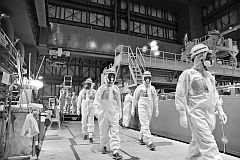
13 Compliance and Enforcement
How do countries ensure compliance with arms control agreements? This unit dives into the complexities of compliance, enforcement, verification, and international norms. The unit features ...
LU 13: Compliance and Enforcement
How do countries ensure compliance with arms control agreements? This unit dives into the complexities of compliance, enforcement, verification, and international norms. The unit features real-world case studies and examines legal and political challenges related to arms control. It also explores global security dynamics and the role of institutions in ensuring compliance.
In this unit, students will explore the key concepts of compliance, enforcement, and verification in international arms control, disarmament, and non-proliferation agreements. They will examine why states comply with treaties, the role of international norms, and the challenges of enforcement. Through case studies, students will assess real-world compliance mechanisms, sanctions, and legal frameworks. By engaging with political, legal, and technical perspectives, students will develop critical thinking, analytical, and research skills. They will also enhance their understanding of international governance structures and the role of institutions such as the UN and treaty organizations in maintaining global security.
Authors
Elisabeth Hoffberger-Pippan
Elisabeth Hoffberger-Pippan is a senior researcher at the Peace Research Institute Frankfurt (PRIF). She holds a PhD in Law from the University of Linz, Austria. Her main research areas include arms control, humanitarian law, and human rights, focusing on biological and chemical weapons as well as emerging technologies in armed conflict.
Una Jakob
Una Jakob is a senior researcher and head of the research group Biological and Chemical Disarmament and Security at the Peace Research Institute Frankfurt (PRIF). She holds a PhD in Political Science from the University of Frankfurt, Germany. Her research interests include biological and chemical weapons disarmament and non-proliferation, international norms, the BWC and CWC, biosecurity, and the governance of emerging technologies and dual-use research in the life sciences.
Veronika Klymova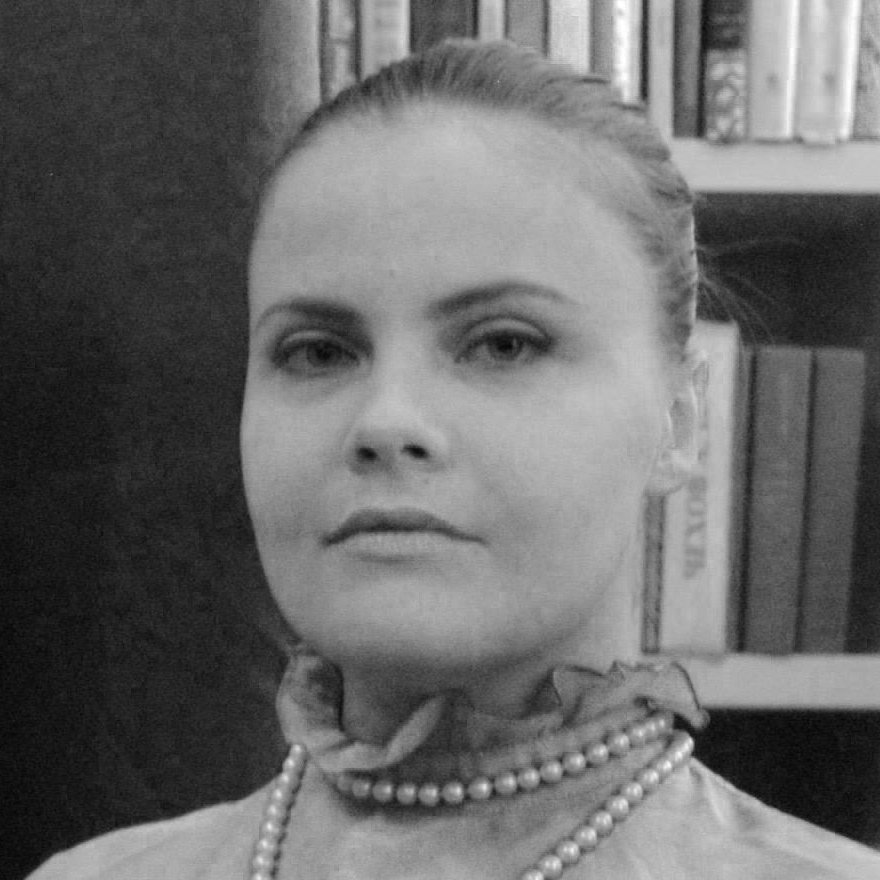
Veronika Klymova is a Researcher at the Peace Research Institute Frankfurt. She is a doctoral candidate in Political Science at the University of Frankfurt, Germany. She holds an MA in International Relations/Political Science from the Geneva Graduate Institute, Switzerland and master’s degrees in International Development and in Psychology. Her main research interests include international norms against biological and chemical weapons, AI governance and moral psychology.

14 EU Disarmament and Non-Proliferation
As an actor in the non-proliferation, disarmament and arms control domain, the European Union has a mixed record. On the one hand, it displays strengths in certain traditional aspects of its ...
LU 14: EU Disarmament and Non-Proliferation
As an actor in the non-proliferation, disarmament and arms control domain, the European Union has a mixed record. On the one hand, it displays strengths in certain traditional aspects of its external relations, such as the provision of assistance and technical cooperation. On the other hand, it keeps a lower profile in politically sensitive areas such as nuclear disarmament and deterrence, where its member states remain divided. Even though the EU has strongly upgraded its profile in the field, notably in the unlikely context of the Iran nuclear crisis over the past decade, its influence there remains limited.
This course unit will familiarise participants with:
- drivers of the EU’s emergence as an actor in non-proliferation and disarmament
- institutional machinery, competences and fields of action
- policies and record in the field
Author
Clara Portela
Dr Clara PORTELA teaches Political Science at the Law School of the University of Valencia, having previously worked as a research fellow with the EU Institute for Security Studies (EUISS) in Paris and Konrad Adenauer Visiting Scholar at Carleton University’s Centre for European Studies in Ottawa. Her research focuses on EU foreign policy, multilateral sanctions and arms control. She holds a PhD from the European University Institute in Florence and an MA from Freie Universität Berlin. In recognition of her work, she received the THESEUS Award for Promising Research on European Integration, and was shortlisted for the 2024 Bernard Brodie Prize. Clara Portela has been a Visiting Professor at the College of Europe, SciencesPo Paris, OSCE Academy, Hitotsubashi University in Tokyo, University of Malaya and the University of Innsbruck.

15 Emerging Technologies
The military use of certain emerging technologies not only has the potential to revolutionise warfare, but also to cause disruption on the international stage. At the same time, traditional arms ...
LU 15: Emerging Technologies
The military use of certain emerging technologies not only has the potential to revolutionise warfare, but also to cause disruption on the international stage. At the same time, traditional arms control measures have little or no effect. New approaches are needed but discussion on the issue has so far been limited.
In this course unit, students are, first, introduced to the debate surrounding the military use of so-called ‘emerging disruptive technologies’ (EDTs). The terms ‘emerging’ and ‘disruptive’ are discussed and the impact of ‘disruptive’ technologies on international security and stability is highlighted, before looking at examples of some of the technologies that often fall under the term EDT. This enables students to scrutinise the use of the concepts and at the same time apply them to other new technologies. Second, students learn the key technical principles of the technologies under discussion, which enables them to better assess the technical details that often characterise the debates. Thirdly, students learn why traditional concepts of arms control are difficult to apply to many EDTs, enabling them to assess the prospects for successful arms control in other new technologies.
Authors
Frank Sauer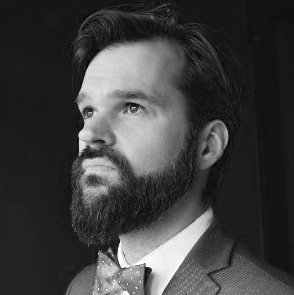
PD Dr Frank Sauer is the Head of Research at the Metis Institute for Strategy and Foresight as well as a Senior Research Fellow at the Bundeswehr University Munich. His main research foci are nuclear issues and emerging technologies. He is the author of the book Atomic Anxiety: Deterrence, Taboo and the Non-Use of US Nuclear Weapons and has had various articles published in journals such as Survival, Security Dialogue, Contemporary Security Policy and the International Review of the Red Cross. Frank also serves on various expert panels advising governments, civil society and industry. He co-hosts the multiple award-winning German language podcast Sicherheitshalber on all things security and defence. You can follow Frank on X/Twitter and BlueSky @drfranksauer.
Niklas Schörnig
Dr Niklas Schörnig is senior research at the Peace Research Institute Frankfurt (PRIF), Germany, and co-head of PRIF’s research group Emerging Disruptive Technologies. He regularly teaches at the Goethe-University Frankfurt. His research focusses on modern warfare, arms control issues and the use of emerging technologies for arms control. His recent publications include, inter alia, “Armament, Arms Control and Artificial Intelligence. The Janus-faced Nature of Machine Learning in the Military Realm” (edited with Thomas Reinhold, Springer, 2022). You can follow Niklas on X/Twitter and BlueSky @niklasschoernig.

16 Gender
While the link between gender and disarmament may not be apparent at first, gender has played an important role in disarmament affairs since the early 20th century. The learning unit will ...
LU 16: Gender
While the link between gender and disarmament may not be apparent at first, gender has played an important role in disarmament affairs since the early 20th century. The learning unit will start by exploring the importance of gender mainstreaming and highlight historic examples of women's movements. The module will then examine the UN Framework on gender and disarmament, key treaties, conventions, and action plans, as well as the idea behind a feminist foreign policy and positions and actions of the EU.
After completing this unit, you will:
- understand gender concepts, such as gender norms, gender identity and gender mainstreaming,
- recognize the unique impact of conflict on women as well as their role in preventing conflict,
- be familiar with key resolutions, treaties and action plans that include gendered aspects in the peace and security discussion,
- gain awareness of initiatives and policies being pursued to enhance the role of women in peace and security,
- learn of the work of the European Union on gender mainstreaming and key actors involved in its implementation.
Author
Mara Zarka
Mara Zarka is Project/Events Manager and Research Associate at the VCDNP. Mara is responsible for the management and coordination of the VCDNP’s projects under the EU Non-Proliferation and Disarmament Consortium. She also serves as the Center’s Gender Champion Focal Point. Her research interests include export controls, IAEA safeguards and verification, non proliferation and arms control.

17 Disarmament Law
International non-proliferation and disarmament law forms part of international law and constitutes one of international law’s many sub-regimes. It addresses very specific issues of major ...
LU 17: Disarmament Law
International non-proliferation and disarmament law forms part of international law and constitutes one of international law’s many sub-regimes. It addresses very specific issues of major significance. However, the founding and functioning principles of non-proliferation and disarmament law are aligned with those of international law.
This learning unit addresses the importance of international law for non-proliferation and disarmament and delves into related areas such as treaty law, the law on the use of force and international human rights law. The learning unit also looks into the state, where national implementation of international non-proliferation and disarmament law is needed in order to carry out international obligations and where national enforcement needs to be undertaken through national authorities, inspections, investigations and court cases. Finally, the learning unit addresses the EU’s legal order on non-proliferation and disarmament.
All these topics are illustrated with numerous examples, appealing to those both with and without a legal background.
After completing the unit, you will:
- understand the relevance of international law in non-proliferation and disarmament
- be familiar with key concepts, such as accession, ratification and “pacta sunt servanda”
- know the difference between legally binding and non-binding instruments
- understand how international non-proliferation and disarmament law is implemented through national law
- learn how both international and national law can be enforced at the national level
- recognise EU law as a subset of international law on non-proliferation and disarmament
Authors
Sonia Drobysz
Sonia Drobysz is Programme Director for VERTIC’s National Implementation Measures programme, where she has been working since 2013 and where she oversees the development and implementation of global projects on the legislative implementation of obligations arising from international instruments for the non-proliferation of CBRN weapons and the security of related materials. She holds a PhD in international law from University Paris I Panthéon Sorbonne.
Yasemin Balci
Yasemin Balci is a Senior Legal Officer for VERTIC’s National Implementation Measures Programme. She manages and implements projects on the legislative implementation of the Chemical Weapons Convention, Biological Weapons Convention, UN Security Council Resolution 1540 and agreements related to nuclear security. Yasemin holds an LLM in international law from the University of Cambridge.

18 UN Disarmament Machinery
Humankind has always been perturbed by the use of particularly cruel means of war. As a result, a number of actions have been taken to restrict such use. The establishment of the United Nations ...
LU 18: UN Disarmament Machinery
Humankind has always been perturbed by the use of particularly cruel means of war. As a result, a number of actions have been taken to restrict such use. The establishment of the United Nations Disarmament Machinery is definitely one step in this direction.
As a key proponent of disarmament since its creation, the UN has over the years heavily and naturally contributed to the definition of the disarmament architecture, pursuing two main goals: first, the elimination of weapons of mass destruction. And second, the regulation of conventional arms, particularly the illicit traffic of small arms and light weapons.
In this learning unit, you will learn about the work and the efforts of the United Nations Disarmament Machinery in promoting arms control, non-proliferation and disarmament.
After completing this learning unit, you will:
- be familiarized with the basic concept of disarmament and its objectives from the United Nations perspective
- understand the role that the United Nations plays in promoting non-proliferation, arms control and disarmament
- be introduced to the UN’s institutional framework, the main bodies and the main instruments pursing disarmament goals
- comprehend the importance of cooperation in disarmament efforts
- understand the interplay between the UN and the European Union in achieving arms control and disarmament objectives
Author
Federica Dall’Arche
Federica Dall’Arche is a policy advisor to the Italian Presidency of the Council of Ministers and a researcher at the International Affairs Institute (Istituto Affari Internazionali, IAI). Her focus is on non-proliferation and disarmament, and gender in international security. She graduated summa cum laude in political science at the University of Roma Tre and won a full merit scholarship for an exchange programme at the Macquarie University in Sydney, Australia. Federica obtained her Master’s degree in Non-Proliferation and Terrorism Studies and a Certificate in Conflict Resolution at the Middlebury Institute of International Studies at Monterey (MIIS), California. In 2014, she won the Michiel Brandt Memorial Prize for best MIIS paper on Human Trafficking and conducted an internship at the Asian-Pacific Center for Security Studies, a US Department of Defense academic institute. She was later the recipient of the United Nations Security Council Monitor Fellowship at the Women’s International League for Peace and Freedom (WILPF), and of the Non-Proliferation and Nuclear Security Fellowship at the Pacific Forum - Center for Strategic and International Studies (CSIS). During her career she has also worked at Deloitte UK, the James Martin Center for Non-Proliferation Studies (CNS), the William Tell Coleman Library, and as a freelance collaborator for the online magazine geopolitica.info.

19 Cyberconflict and Cyberstrategy
Hardly a day passes without bad news from the cyber sector: Cyberattacks against state and military institutions are now almost the norm, and private individuals must be enormously wary of phishing...
LU 19: Cyberconflict and Cyberstrategy
Hardly a day passes without bad news from the cyber sector: Cyberattacks against state and military institutions are now almost the norm, and private individuals must be enormously wary of phishing or encryption attacks. The internet, labelled by Chancellor Merkel in 2013 as “uncharted territory”, seems to have become a conflict zone where malevolent state and non-state actors are up to mischief. The press therefore often indulges in hyperbole about “cyberwars” or “cyberattacks”. On the other hand, the worst fears of a cyber-Pearl Harbour have (so far?) not materialized. So where do we stand at the moment?
In this learning unit we try to distinguish between the different levels of cyber threats by looking at different actors capable of aggressive cyber operations. We also look at the international legal framework and the options available to make cyberspace more secure – both at the state and civilian level. After completing this learning unit, you will:
- be familiarized with the basic concepts of different cyber incidents
- understand why the cyber realm is no lawless territory from the perspective of international law
- be introduced to different state and non-state actors which might, or might not, pose a threat to cybersecurity
- comprehend limits and possibilities of arms control and disarmament in the cyber realm
- understand the specific EU policy on cybersecurity
Author
Niklas Schörnig
Dr Niklas Schörnig is senior research at the Peace Research Institute Frankfurt (PRIF), Germany, and co-head of PRIF’s research group Emerging Disruptive Technologies. He regularly teaches at the Goethe-University Frankfurt. His research focusses on modern warfare, arms control issues and the use of emerging technologies for arms control. His recent publications include, inter alia, “Armament, Arms Control and Artificial Intelligence. The Janus-faced Nature of Machine Learning in the Military Realm” (edited with Thomas Reinhold, Springer, 2022). You can follow Niklas on X/Twitter and BlueSky @niklasschoernig.

20 Arms Control History
This learning unit aims to provide a brief history of arms control in a classical chronological order, focusing primarily on the West, from antiquity to the present. In doing so, it postulates that...
LU 20: Arms Control History
This learning unit aims to provide a brief history of arms control in a classical chronological order, focusing primarily on the West, from antiquity to the present. In doing so, it postulates that arms control may be considered a relevant discipline from that time, along a more or less continuous chronological line. In reality, there is nothing obvious about these assumptions. In the strictest sense, it could be argued that arms control as a discipline emerged in the 1950s in the context of the bilateral US–USSR strategic relationship, within the very specific framework of the bilateral nuclear deterrence dialogue in a very dated context of ideological and strategic bipolarization of the world. This is why the very question of what is arms control is posed as such in the introduction to this module, and must feed into the unfolding of a long history.
To be fair, it would be appropriate to elaborate on this point by warning that this course is intended to illustrate the various ways in which the West, in particular, has approached the question of the volume of violence in military affairs, between human communities which become essentially interstate from the moment the modern state is born.
Naturally, because the discipline is structured in the second half of the twentieth century, this course focuses on shorter periods and makes the subject more dense. The aim is to detail the different phases that led to a multiplication of initiatives at the end of the last century, to the point where arms control became near synonymous with international security.
At the time of writing, the Russian invasion of Ukraine has been ongoing for three weeks. This historic event, likely one of the foundational events of the present century, will leave its mark on the contemporary history of arms control in a way that is still too early to define. Though it reminds us that the historical evolution of war itself has always been accompanied by attempts to limit its effects, whatever the method. The history of arms control is the reverse side of a history of war between peoples.
Author
Benjamin Hautecouverture
Benjamin Hautecouverture is a Senior research fellow for arms control, non-proliferation and disarmament issues at the Fondation pour la recherche stratégique (FRS), Paris, France. He is the Technical Director of the EU Partner to Partner programme of the European Union for the implementation and universalisation of the Arms Trade Treaty, at Expertise France. He is a senior fellow at the Canadian Global Affairs Institute, in Ottawa, and was formerly a lecturer at Sciences Po and the Ecole Polytechnique, both in Paris. For two decades, his areas of focus have included the study of strategic relations between states; nuclear deterrence; non-proliferation and disarmament in the field of weapons of mass destruction and conventional weapons; the nuclear proliferation phenomenon and nuclear proliferation crises; and the North-East Asian strategic landscape with a focus on the North Korea nuclear and ballistic issues. He continues to work on nuclear security, the NPT review process, the chemical weapons prohibition regime, along with European Union security and defense challenges and prospects, including the various EU security strategies. He is the author of several books in collaboration: The Nuclear Nonproliferation Regime at a Crossroads (Palgrave MacMillan, 2014), WMD Arms Control in the Middle East: Prospects, Obstacles and Options (Routledge, 2015), among others. He regularly publishes articles on major international security issues. As of March 2022, his latest articles addressed the issue of European strategic autonomy, the future of strategic stability, strategic risk reduction, the NPT and the P5 process, nuclear security and terrorism, and the Arms Trade Treaty (ATT).
Certificates
Test your knowledge and receive the Basic Certificate for completing the first five, and the Comprehensive Certificate for completing all 20 learning units.
All learning unit content is accessible without registration, but a free account is required to access the certificate section. If you don't have an account, you can register here. Terms apply.
First time here? Create a new account.
Contributors
-
Nils Duquet
Nils Duquet is the Director of the Flemish Peace Institute, an independent research institute affiliated to the Flemish Parliament (Belgium). He started working at the Institute as a researcher in 2006 and has authored more than 70 policy-oriented and academic publications on illicit firearms trafficking and gun violence in Europe, domestic gun policies and European arms export controls. In recent years, he has coordinated several large-scale European research projects on gun violence and arms trafficking in Europe.
Learning Unit
- LU 10: Humanitarian Arms Control II
-
Jana Robinson
Dr Jana Robinson became Managing Director of the Prague Security Studies Institute (PSSI) in April 2020. She also serves as PSSI’s Space Security Program Director, a post she assumed in 2015. She previously held the position of Space Policy Officer at the European External Action Service (EEAS) in Brussels as well as Space Security Advisor to the Czech Foreign Ministry. From 2009 to 2013, Dr Robinson worked at the European Space Policy Institute (ESPI), seconded from the European Space Agency (ESA), leading the Institute’s Space Security Research Programme. Dr Robinson is an elected member of the International Institute of Space Law (IISL) and the International Academy of Astronautics (IAA). She is also a member of the Advisory Board of the George C. Marshall Missile Defense Project of the Center for Strategic and International Studies (CSIS) in Washington, D.C. Dr Robinson holds a PhD in the field of space security from the Charles University’s Faculty of Social Sciences, Institute of Political Studies and received two MA degrees from George Washington University’s Elliott School of International Affairs and Palacky University in Olomouc, respectively.
Learning Unit
- LU 08: Space Security
-
Erzsébet Rózsa
Erzsébet N. Rózsa (born 1959) has an MA in Arabic Studies, Iranian Studies as well as English Studies. She holds a PhD in International Relations (1996). She is a Professor at the University of Public Service, Budapest and is an Academic Advisor at the Institute for World Economics of the Center for Economic and Regional Studies. She is also an External Fellow at the Institute of Foreign Affairs and Trade. Her fields of research include the political, security and social processes of the Middle East, Egypt, Iran, the Iranian nuclear debate, nuclear non-proliferation, as well as the Euro-Mediterranean cooperation institutions.
Learning Unit
- LU 06: WMD-free Zones
-
Łukasz Kulesa
Łukasz Kulesa is Director of Proliferation and Nuclear Policy at the Royal United Services Institute (RUSI). His research interests include nuclear and conventional deterrence, arms control, Euro-Atlantic security, non-proliferation of weapons of mass destruction and the transatlantic security relationship. balPrior to joining RUSI, Łukasz was Deputy Head of Research Office at the Polish Institute of International Affairs (Warsaw). He also worked as Research Director at the European Leadership Network (ELN). He holds a master’s degree in international relations and European studies from the Central European University and is a graduate of the law department of the Jagiellonian University.
Learning Unit
- LU 11: Arms Control In Europe
-
Jean Pascal Zanders
Dr Jean Pascal Zanders (Belgium) is an independent researcher/consultant on disarmament and security questions. He heads The Trench, a research initiative dedicated to the future of disarmament. He is also a non-resident Senior Research Associate at the Fondation pour la Recherche Stratégique (Paris). He holds Master’s Degrees in Germanic Philology-Linguistics (1980) and Political Sciences (1992) and a PhD Degree in Political Sciences (1996) from the Free University of Brussels. He was Project Leader of the Chemical and Biological Warfare Project at the Stockholm International Peace Research Institute (1996–2003), Director of the Geneva-based BioWeapons Prevention Project (2003–08) and Senior Research Fellow at the European Union Institute for Security Studies (2008–13). He has participated as an expert to the Belgian and EU Delegations in the BTWC and CWC meetings since 2009. From January 2016 until December 2019, he chaired the Advisory Board on Education and Outreach (ABEO) of the Organisation for the Prohibition of Chemical Weapons (OPCW) and remained a member until December 2021.
Learning Unit
- LU 02: Chemical Weapons
-
Frank Sauer
PD Dr Frank Sauer is the Head of Research at the Metis Institute for Strategy and Foresight as well as a Senior Research Fellow at the Bundeswehr University Munich. His main research foci are nuclear issues and emerging technologies. He is the author of the book Atomic Anxiety: Deterrence, Taboo and the Non-Use of US Nuclear Weapons and has had various articles published in journals such as Survival, Security Dialogue, Contemporary Security Policy and the International Review of the Red Cross. Frank also serves on various expert panels advising governments, civil society and industry. He co-hosts the multiple award-winning German language podcast Sicherheitshalber on all things security and defence. You can follow Frank on X/Twitter and BlueSky @drfranksauer.
Learning Unit
- LU 15: Emerging Technologies
-
Filippa Lentzos
Dr Filippa Lentzos is Reader (Associate Professor) in Science & International Security at King’s College London, with a joint appointment in the Department of War Studies and in the Department of Global Health & Social Medicine. She is also an Associate Senior Researcher at the Stockholm International Peace Research Institute (SIPRI) in Sweden and a Non-Resident Scholar at the James Martin Center for Nonproliferation Studies (CNS) in the United States. Lentzos serves as the NGO Coordinator for the Biological Weapons Convention. She is a member of the UK Biosecurity Leadership Council and of the WHO Health Security Interface Technical Advisory Group (HSI-TAG). She also serves as an adviser and mentor on the Young Women in Non-Proliferation and Disarmament mentorship programme, and as an advisory board member at the Vienna Center for Disarmament and Non-Proliferation (VCDNP) in Austria. A biologist and social scientist by training, Lentzos has researched and been actively involved in biological disarmament and non-proliferation for over two decades. For more about her work, see www.filippalentzos.com
Learning Unit
- LU 03: Biological Weapons
-
Niklas Schörnig
Dr Niklas Schörnig is senior research at the Peace Research Institute Frankfurt (PRIF), Germany, and co-head of PRIF’s research group Emerging Disruptive Technologies. He regularly teaches at the Goethe-University Frankfurt. His research focusses on modern warfare, arms control issues and the use of emerging technologies for arms control. His recent publications include, inter alia, “Armament, Arms Control and Artificial Intelligence. The Janus-faced Nature of Machine Learning in the Military Realm” (edited with Thomas Reinhold, Springer, 2022). You can follow Niklas on X/Twitter and BlueSky @niklasschoernig.
Learning Units
- LU 15: Emerging Technologies
- LU 19: Cyberconflict and Cyberstrategy
-
Anna Péczeli
Anna Péczeli is a Visiting Research Scholar at The Europe Center at Stanford University, and an adjunct fellow at the Centre for Strategic and Defence Studies (CSDS) in Hungary. Previously, she was a Senior Research Fellow at CSDS, and a Stanton Nuclear Security Fellow at Stanford University’s Center for International Security and Cooperation. Before these positions, she was an assistant lecturer at Corvinus University of Budapest, an adjunct fellow at the Hungarian Institute of International Affairs, a visiting research fellow at the Peace Research Institute Frankfurt, and a visiting Fulbright fellow at the Federation of American Scientists in Washington, DC. She earned a Ph.D. degree in International Relations from Corvinus University of Budapest, and her research focused on the Obama administration’s nuclear strategy.
Learning Unit
- LU 06: WMD-free Zones
-
Mara Zarka
Mara Zarka is Project/Events Manager and Research Associate at the VCDNP. Mara is responsible for the management and coordination of the VCDNP’s projects under the EU Non-Proliferation and Disarmament Consortium. She also serves as the Center’s Gender Champion Focal Point. Her research interests include export controls, IAEA safeguards and verification, non proliferation and arms control.
Learning Unit
- LU 16: Gender
-
Sonia Drobysz
Sonia Drobysz is Programme Director for VERTIC’s National Implementation Measures programme, where she has been working since 2013 and where she oversees the development and implementation of global projects on the legislative implementation of obligations arising from international instruments for the non-proliferation of CBRN weapons and the security of related materials. She holds a PhD in international law from University Paris I Panthéon Sorbonne.
Learning Unit
- LU 17: Disarmament Law
-
Yasemin Balci
Yasemin Balci is a Senior Legal Officer for VERTIC’s National Implementation Measures Programme. She manages and implements projects on the legislative implementation of the Chemical Weapons Convention, Biological Weapons Convention, UN Security Council Resolution 1540 and agreements related to nuclear security. Yasemin holds an LLM in international law from the University of Cambridge.
Learning Unit
- LU 17: Disarmament Law
-
Federica Dall’Arche
Federica Dall’Arche is a policy advisor to the Italian Presidency of the Council of Ministers and a researcher at the International Affairs Institute (Istituto Affari Internazionali, IAI). Her focus is on non-proliferation and disarmament, and gender in international security. She graduated summa cum laude in political science at the University of Roma Tre and won a full merit scholarship for an exchange programme at the Macquarie University in Sydney, Australia. Federica obtained her Master’s degree in Non-Proliferation and Terrorism Studies and a Certificate in Conflict Resolution at the Middlebury Institute of International Studies at Monterey (MIIS), California. In 2014, she won the Michiel Brandt Memorial Prize for best MIIS paper on Human Trafficking and conducted an internship at the Asian-Pacific Center for Security Studies, a US Department of Defense academic institute. She was later the recipient of the United Nations Security Council Monitor Fellowship at the Women’s International League for Peace and Freedom (WILPF), and of the Non-Proliferation and Nuclear Security Fellowship at the Pacific Forum - Center for Strategic and International Studies (CSIS). During her career she has also worked at Deloitte UK, the James Martin Center for Non-Proliferation Studies (CNS), the William Tell Coleman Library, and as a freelance collaborator for the online magazine geopolitica.info.
Learning Unit
- LU 18: UN Disarmament Machinery
-
Benjamin Hautecouverture
Benjamin Hautecouverture is a Senior research fellow for arms control, non-proliferation and disarmament issues at the Fondation pour la recherche stratégique (FRS), Paris, France. He is the Technical Director of the EU Partner to Partner programme of the European Union for the implementation and universalisation of the Arms Trade Treaty, at Expertise France. He is a senior fellow at the Canadian Global Affairs Institute, in Ottawa, and was formerly a lecturer at Sciences Po and the Ecole Polytechnique, both in Paris. For two decades, his areas of focus have included the study of strategic relations between states; nuclear deterrence; non-proliferation and disarmament in the field of weapons of mass destruction and conventional weapons; the nuclear proliferation phenomenon and nuclear proliferation crises; and the North-East Asian strategic landscape with a focus on the North Korea nuclear and ballistic issues. He continues to work on nuclear security, the NPT review process, the chemical weapons prohibition regime, along with European Union security and defense challenges and prospects, including the various EU security strategies. He is the author of several books in collaboration: The Nuclear Nonproliferation Regime at a Crossroads (Palgrave MacMillan, 2014), WMD Arms Control in the Middle East: Prospects, Obstacles and Options (Routledge, 2015), among others. He regularly publishes articles on major international security issues. As of March 2022, his latest articles addressed the issue of European strategic autonomy, the future of strategic stability, strategic risk reduction, the NPT and the P5 process, nuclear security and terrorism, and the Arms Trade Treaty (ATT).
Learning Unit
- LU 20: Arms Control History
-
Frank Kuhn
Frank Kuhn is a Doctoral Researcher at Peace Research Institute Frankfurt (PRIF), Germany. His research interests include arms control and nonproliferation, nuclear deterrence, military technology, and military strategy. In his dissertation, he explores the motives of high-level U.S. decisionmakers to engage in strategic arms reductions talks with the Soviet Union and Russia. Frank Kuhn is also the Project Coordinator for the Cluster for Natural and Technical Science Arms Control Research (CNTR) at PRIF, which analyzes emerging technologies and developments in the natural and technical sciences from an interdisciplinary perspective. He holds an M.A. in International Studies/Peace and Conflict Studies from Goethe University Frankfurt and Technical University Darmstadt, Germany, and a B.A. in Political Science, also from Goethe University Frankfurt. Frank Kuhn is member of the Young Deep Cuts Commission and a 2025 Nuclear Scholar of the Project on Nuclear Issues (PONI) at the Center for Strategic and International Studies (CSIS) in Washington, D.C.
Learning Unit
- LU 01: Arms Control Basics
-
Cecilia Gustavsson
Cecilia Gustavsson is an associate professor in Applied Nuclear physics at Uppsala University with a background in experimental nuclear physics. She is currently a member of the working group on Technical Verification and Monitoring at the Alva Myrdal Centre for Nuclear Disarmament.
Learning Unit
- LU 04: Nuclear Weapons I
-
Débora Trombetta
Débora Trombetta is a researcher at the Department of Applied Nuclear Physics from Uppsala University, in Sweden. Débora has a PhD in applied nuclear physics and her background is in Nuclear Nonproliferation. Débora also performed research in the area of nuclear disarmament verification under the working group on Technical Verification and Monitoring from the Alva Myrdal Centre for Nuclear Disarmament.
Learning Unit
- LU 04: Nuclear Weapons I
-
Manuel Herrera
Dr Manuel Herrera is a Senior Policy Fellow at BASIC, the Programme Manager of the Non-Proliferation and Disarmament Programme, and the Project Manager of the Nuclear Non-Proliferation Treaty (NPT) Monitor project. Manuel conducts research in the field of non-proliferation and disarmament, with a specific expertise on the Iranian nuclear programme and nuclear diplomacy in the context of the NPT. Previously, Manuel was Research Fellow in the Multilateralism and Global Governance programme at the Istituto Affari Internazionali (IAI, Rome), where he co-managed IAI’s activities within the EU Non-Proliferation and Disarmament Consortium (EUNPDC). He was also a research assistant in the nuclear security programme at the Institute of Peace and Conflict Studies, New Delhi, India; worked at the Office of Geopolitical Analysis of the Spanish Ministry of Defence; and was an EUNPDC intern within the “Next Generation” programme at the Institute for Foreign and International Policy (INCIPE) in Madrid. Finally, Manuel was a non-doctoral fellow at the Centre for International Studies in Lisbon, and a visiting researcher at the Peace Research Institute Frankfurt. He holds a Master’s degree in International Security from the Institute of International Studies of Barcelona (IBEI) and a PhD from the King Juan Carlos University of Madrid in the Social and Legal Sciences programme, specialising in Public International Law and International Relations.
Learning Unit
- LU 05: Nuclear Weapons II
-
Ottavia Credi
Ottavia Credi was a Researcher in IAI’s Defence and Security Programmes. She specialises in international security, European and transatlantic defence, disarmament and non-proliferation. Formerly, Ottavia worked at the European Parliament in Brussels and at the American Security Project in Washington DC. Ottavia holds a Bachelor of Arts in International Studies from the University of Trento and a Master of Arts in Intelligence & International Security from King’s College London’s War Studies Department. She currently works as a consultant on EU policies.
Learning Unit
- LU 05: Nuclear Weapons II
-
Fabian Hoffmann
Fabian Hoffmann is a Doctoral Research Fellow at the Oslo Nuclear Project (ONP) at the University of Oslo. His research focuses on missile technology, nuclear strategy and defence policy. His PhD project addresses the implications of conventional long-range strike weapons on nuclear strategy. Fabian’s research has been published in the Journal of Strategic Studies, European Security, War on the Rocks and The Washington Post, among others. He frequently contributes to the national and international news, providing commentary for both print and broadcast media.
Learning Unit
- LU 07: Missiles
-
Kristína Sikoraiová
Kristína Sikoraiová joined the Prague Security Studies Institute in February 2020 and has since contributed her expertise to the Space Security Program. She holds a Master’s degree in International Relations and Diplomacy, with a minor in Managerial Psychology and Sociology, earned at the Prague University of Economics and Business. Her Master’s thesis explored the field of cybersecurity in space, with a specific emphasis on EU–US cooperation. The research Ms Sikoraiová conducted for her undergraduate dissertation centered on how the People’s Republic of China is expanding its global influence through the space sector.
Learning Unit
- LU 08: Space Security
-
František Avrat
František Avrat is a Project Coordinator supporting the Space Security Program. Mr Avrat holds a bachelor’s degree in China Studies from Masaryk University and a master’s degree in Asia Pacific Studies from National Chengchi University in Taiwan, with a focus on Chinese sharp power in Czech–Sino relations. He also holds the Erasmus Mundus Master’s degree in Intelligence, Security and Strategic Studies. His main area of interest is space security, the role and tactics of the People’s Republic of China in the international system, and emerging disruptive technologies.
Learning Unit
- LU 08: Space Security
-
Kelig Chappuis
Kelig Chappuis is also a Project Coordinator for PSSI’s Space Security Program. He holds a BSc in Forensic Science and an International Master’s in Security, Intelligence and Strategic Studies. He wrote his master’s thesis on intelligence processes in peacekeeping operations, and specialises in OSINT data management and link analysis. He also served as a special forces communications officer in the Swiss Armed Forces.
Learning Unit
- LU 08: Space Security
-
Jakub Pražák
Dr Jakub Pražák is a Research Fellow in the PSSI’s Space Security Program, which he joined as a Project Assistant in June 2018. Dr Pražák is the first graduate of the William P. Clark Ph.D. Scholarship in Space Security. His research focused primarily on space threats and offensive counterspace technology. Dr Pražák holds two Master’s degrees in Security Studies and International Relations and a Bachelor’s degree in Political Science and International Relations from Charles University. Before joining PSSI, Dr Pražák was an intern at the Czech Ministry of Defence and at the National Cyber and Information Security Agency.
Learning Unit
- LU 08: Space Security
-
Patrik Martínek
Patrik Martínek is a Project Coordinator at PSSI, mainly focusing on projects connected with space security. He holds a Bachelor’s degree in International Studies and Diplomacy, and a Master’s degree in International Politics and Diplomacy from the Prague University of Economics and Business. He wrote his Bachelor’s dissertation on current trends in space security, and his Master’s dissertation focused on the topic of space traffic management.
Learning Unit
- LU 08: Space Security
-
Nico Mastrangelo
Nico Mastrangelo, a student of PPE, is deeply curious about the world around him. In the context of his career, he has since spent time in various industries, including the Theater, Service, Communications, Journalism, and Research sectors. Currently, as a Project Coordinator at the prestigious Prague Security Studies Institute, Nico has had the wonderful privilege of assisting with various projects; while primarily working within the Economic and Financial Statecraft Program, he jumped at the opportunity to harness his previous skill sets to assemble this learning unit. He hopes you learn as much by listening to it, as he did making it!
Learning Unit
- LU 08: Space Security
-
Margarita Petrova
Margarita Petrova is an assistant professor at the INSTITUT BARCELONA D'ESTUDIS INTERNACIONALS (IBEI) where she teaches courses in International Relations and International Peace and Security. She holds a PhD degree in Government from Cornell University and her doctoral thesis, "Leadership Competition and the Creation of Norms: A Cross-National Study of Weapons Restrictions," received the 2008 Helen Dwight Reid award for best dissertation in international relations, law and politics from the American Political Science Association. Margarita's main interests are in the area of international norm development, ethical and legal issues in international relations, security studies and arms control, and transnational activism and NGO advocacy.
Learning Unit
- LU 09: Humanitarian Arms Control I
-
Majlinda Behrami
Majlinda Behrami conducts research on gender, small arms control, and women, peace and security. Currently, she is affiliated with the South Eastern and Eastern Europe Clearinghouse for the Control of Small Arms and Light Weapons (SEESAC), analysing the progress in the Western Balkans toward implementing the roadmap for a sustainable solution to arms control. Previously, at the Flemish Peace Institute, she worked on firearms-related gender-based violence in the European Union. Majlinda is part of the third cohort of the Young Women in Non-Proliferation and Disarmament Mentorship Programme, organised within the framework of the EU Non-Proliferation and Disarmament Consortium.
Learning Unit
- LU 10: Humanitarian Arms Control II
-
Linde Desmaele
Linde Desmaele is an Assistant Professor of Intelligence and Security at the Institute of Security and Global Affairs (ISGA) at Leiden University. She is also a Senior Associate Researcher at the Centre for Security, Diplomacy and Strategy (CSDS) at the Brussels School of Governance. Linde’s work is situated at the intersection of international relations and security studies, with a focus on nuclear politics, US alliances and European security. Before joining Leiden University, she held fellowships at MIT and Columbia University. She holds a PhD from the Vrije Universiteit Brussel, where her dissertation earned her the 2022 Global Strategy PhD Prize.
Learning Unit
- LU 11: Arms Control In Europe
-
Lauriane Héau
Lauriane Héau (France) is a Researcher with SIPRI’s Dual-Use and Arms Trade Control Programme. As part of her work, she follows developments within the main instruments and regulations established to regulate the arms and dual-use trade at the national, european and international levels. Her recent work focused on the MTCR, the impact of NewSpace, and intangible transfers of technology. She also conducts research on mitigating arms diversion risks, and follows developments within the Arms Trade Treaty.
Learning Unit
- LU 12: Export Controls
-
Giovanna Maletta
Giovanna Maletta (Italy) is a Senior Researcher with SIPRI’s Dual-Use and Arms Trade Control Programme. Her research work at SIPRI examines issues related to the implementation of national, multilateral and international export control standards and instruments, with a particular focus on EU engagement with arms export policies and the ATT. Giovanna’s work also involves mapping cooperation and assistance activities in the field of arms transfer and SALW controls.
Learning Unit
- LU 12: Export Controls
-
Kolja Brockmann
Kolja Brockmann (Germany) is an independent consultant and a Senior Researcher (non-resident) with SIPRI’s Dual-Use and Arms Trade Control Programme. His recent work has focused on the multilateral export control regimes, post-shipment controls, and non-proliferation and export control challenges linked to additive manufacturing, hypersonic missile technology and the NewSpace industry. Kolja routinely gives lectures and presentations to a range of audiences, provides policy advice and contributes to export control capacity-building programmes.
Learning Unit
- LU 12: Export Controls
-
Elisabeth Hoffberger-Pippan
Elisabeth Hoffberger-Pippan is a senior researcher at the Peace Research Institute Frankfurt (PRIF). She holds a PhD in Law from the University of Linz, Austria. Her main research areas include arms control, humanitarian law, and human rights, focusing on biological and chemical weapons as well as emerging technologies in armed conflict.
Learning Unit
- LU 13: Compliance and Enforcement
-
Una Jakob
Una Jakob is a senior researcher and head of the research group Biological and Chemical Disarmament and Security at the Peace Research Institute Frankfurt (PRIF). She holds a PhD in Political Science from the University of Frankfurt, Germany. Her research interests include biological and chemical weapons disarmament and non-proliferation, international norms, the BWC and CWC, biosecurity, and the governance of emerging technologies and dual-use research in the life sciences.
Learning Unit
- LU 13: Compliance and Enforcement
-
Veronika Klymova
Veronika Klymova is a Researcher at the Peace Research Institute Frankfurt. She is a doctoral candidate in Political Science at the University of Frankfurt, Germany. She holds an MA in International Relations/Political Science from the Geneva Graduate Institute, Switzerland and master’s degrees in International Development and in Psychology. Her main research interests include international norms against biological and chemical weapons, AI governance and moral psychology.
Learning Unit
- LU 13: Compliance and Enforcement
-
Clara Portela
Dr Clara PORTELA teaches Political Science at the Law School of the University of Valencia, having previously worked as a research fellow with the EU Institute for Security Studies (EUISS) in Paris and Konrad Adenauer Visiting Scholar at Carleton University’s Centre for European Studies in Ottawa. Her research focuses on EU foreign policy, multilateral sanctions and arms control. She holds a PhD from the European University Institute in Florence and an MA from Freie Universität Berlin. In recognition of her work, she received the THESEUS Award for Promising Research on European Integration, and was shortlisted for the 2024 Bernard Brodie Prize. Clara Portela has been a Visiting Professor at the College of Europe, SciencesPo Paris, OSCE Academy, Hitotsubashi University in Tokyo, University of Malaya and the University of Innsbruck.
Learning Unit
- LU 14: EU Disarmament and Non-Proliferation
-
Christopher Daase
Christopher Daase is Professor of International Relations at Goethe University Frankfurt, Germany, and Deputy Director of the Peace Research Institute Frankfurt (PRIF) where he heads the research department on “International Security”. His research and teaching focuses on security policy (especially wars and civil wars, terrorism and radicalization, non-proliferation and arms control) as well as international institutions. Dr. Daase studied political science, literature, philosophy and art history in Hamburg, Freiburg and Berlin and conducted doctoral research as a SSRC-MacArthur Fellow in International Peace and Security at Harvard University and the RAND Corporation. In 1996 he received his doctorate from the FU Berlin with a thesis on unconventional warfare. He is co-founder of the Arms Control Negotiation Academy (ACONA), and member of the Executive Board of the EU Non-Proliferation and Disarmament Consortium. Dr. Daase has published several books and numerous articles in international journals and was editor of the leading German international relations journal for more than ten years. Since 2022 he is member of the Advisory Board on Education and Outreach of the Organisation for the Prohibition of Chemical Weapons (OPCW).
Learning Unit
- LU 01: Arms Control Basics
-
Mark Fitzpatrick
Mark Fitzpatrick is Executive Director of IISS-US and Director of the Non-Proliferation and Nuclear Policy Programme. He is the author of "Asia’s Threshold Nuclear Powers: Japan, South Korea and Taiwan" (February 2016); "Overcoming Pakistan’s Nuclear Dangers" (2014) and "The Iranian Nuclear Crisis: Avoiding worst-case outcomes" (2008). He is the editor of six IISS Strategic Dossiers on countries and regions of proliferation concern, including "Nuclear Black Markets: Pakistan, A.Q. Khan and the rise of proliferation networks" (2007). He has lectured throughout the world and is a frequent media commentator. Prior to joining the IISS, Mark had a 26-year career with the US Department of State, including as Deputy Assistant Secretary of State for Non-Proliferation (acting).
-
Giorgio Franceschini
Giorgio Franceschini leads the Foreign and Security Policy Division at the Heinrich-Böll Foundation, Berlin. Previously, he was a Research Associate at the Peace Research Institute Frankfurt (PRIF) with a research focus on nuclear arms control with a special emphasis on technical aspects of nuclear non-proliferation and disarmament.
-
Michael Romancov
Michael Romancov is head of Geopolitical Studies Program (GPS) at Institute of Political Studies at Faculty of Social Sciences, Charles University. He is a senior lecturer at Institute of Political Studies and at Metropolitan University Prague, his specialization is political geography, geopolitics and Russia. Mr. Romancov cooperates with Czech printed and electronic media, frequently comments on international relations for Czech and Slovak TV and radio. He holds a PhD from the Charles University’s Faculty of Social Sciences, Institute of Political Studies.
-
Lina Grip
Lina Grip is a Researcher at the European Security Programme at the Stockholm International Peace Research Institute (SIPRI) since 2011. She has published extensively on EU non-proliferation policies and coordinated the non-proliferation paper series for the EU Non-Proliferation Consortium 2011-2017. She has a Master Degree in International Relations from Stockholm University.
-
Wyn Bowen
Wyn Bowen is Professor of Non-Proliferation and International Security, King’s College London, and Head of the School of Security Studies. He has written widely on CBRN related issues including books on Libya’s nuclear programme (2006), the G8 Global Partnership Against WMD (2012) and Iranian nuclear behaviour (2016). He has served as a missile inspector in Iraq with the UN Special Commission (1997-98), as a consultant to the International Atomic Energy Agency (IAEA) and as a Specialist Advisor to the House of Commons Foreign Affairs Committee on CBRN related issues.
-
Maya Brehm
Maya Brehm is an advisor with Article 36 and works as a consultant in the field of international law and disarmament. Previously, Maya Brehm was the lead researcher in weapons law at the Geneva Academy of International Humanitarian Law and Human Rights and a lecturer at the Geneva Centre for Education and Research in Humanitarian Action. Previously, Maya Brehm led a research project on the protection of civilians from the effects of explosive weapons at the United Nations Institute for Disarmament Research and worked as a protection delegate with the International Committee of the Red Cross.
-
Roberta Mulas
Roberta Mulas is an adjunct lecturer at LUISS University (Italy) and holds a PhD in international politics from the University of Warwick (UK) and LUISS through the EU GEM joint doctoral program. Her research interests are the global disarmament movement, the Nuclear Non-Proliferation Treaty and Middle Eastern security. She previously worked at the Peace Research Institute Frankfurt (PRIF), at the United Nations University institute on Comparative Regional Integration Studies (UNU-CRIS) and at the Italian Permanent Mission at the United Nations in New York. She did her studies at the University of Bologna (Italy) as well as at UCLA (U.S.) and in Spain.
-
Christopher Hobbs
Christopher Hobbs is Co-Director of the Centre for Science and Security Studies (CSSS) and a Reader within the Department of War Studies at King's College London. A physicist by background he works on nuclear security, non-proliferation and intelligence issues. His current research interests include insider threat mitigation, maritime security and applied security culture. He is project lead for UK Government’s Global Threat Reduction Programme (GTRP) work stream on Nuclear Security Culture and has served as a subject matter expert on multiple IAEA training courses. He is a former Chair of the International Nuclear Security Education Network (INSEN).
-
Harald Müller
Harald Müller received his Ph.D. from Goethe University Frankfurt, is Executive Director (ret.) of Peace Research Institute Frankfurt which he led 1996-2015, and Professor emeritus for International Relations at Goethe University Frankfurt where he taught 1999-2016. He served on the German Delegation for all NPT Review Conferences 1995-2015, on the UN Secretary General’s Advisory Board for Disarmament as member (1999-2005) and as chair (2004), and as Vice-president of the EU Consortium for Non-proliferation and Disarmament (2011-2016).
-
Elli Kytömäki
Elli Kytömäki is an independent policy analyst and researcher working on disarmament and arms control issues, most notably related to conventional arms transfer controls and nuclear non-proliferation. She is also an Associate Fellow at Chatham House (UK) and a member of Finnish peace and security think-tank SaferGlobe. Prior to establishing her own consultancy, in 2009-2012 Ms. Kytömäki was the Project Manager at the United Nations Institute for Disarmament Research (UNIDIR) for two projects funded by the EU to support the Arms Trade Treaty negotiations. Before assuming the responsibility for these projects at UNIDIR, Ms. Kytömäki worked as a Forum for Security Co-operation (FSC) Support Officer at the OSCE Secretariat in Vienna. Ms. Kytömäki worked at UNIDIR also in 2003-2006, specializing in small arms and explosive remnants of war. During her career, Ms. Kytömäki has additionally worked at the research institute Small Arms Survey, the UN Office for the Coordination of Humanitarian Affairs (OCHA), and the Permanent Mission of Finland to the UN Conference on Disarmament. Ms. Kytömäki has authored several articles and papers on arms transfer controls and nuclear policy and eagerly follows international developments in these areas.
-
Jacek Durkalec
Jacek Durkalec is a Research Analyst at the Polish Institute of International Affairs (PISM). He has been working at PISM since July 2010, focusing on NATO's deterrence and defence policy, nuclear and conventional arms control, missile defence, and WMD non-proliferation issues. Before joining PISM, he was a staff member in the Missile Defence Office of the Polish Ministry of National Defence from February 2009 to June 2010. His work experience also includes an internship from July to September 2008 in the Strategic Planning Unit of the Executive Office of the Secretary-General of the United Nations. Jacek’s publications include: Nuclear-Backed “Little Green Men:” Nuclear Messaging in the Ukraine Crisis (Polish Institute of International Affairs, 2015); Options for Transparency and Confidence-Building Measures Related to Non-Strategic Nuclear Weapons in Europe: Cost-Benefit Matrix (Polish Institute of International Affairs, 2014, co-authored with A. Zagorski); The Role of Missile Defence in NATO Deterrence (in: Regional Approaches to the role of Missile Defence in Reducing Nuclear Threats, Polish Institute of International Affairs, 2013); and Rethinking conventional arms control in Europe: A transparency-centred approach (Polish Institute of International Affairs, 2013).
-
Marco Fey
Marco Fey is a desk officer at Germany's Federal Ministry of Defense. Previously, he was a Research Associate at the Peace Research Institute Frankfurt (PRIF), where his research was focused on strategic arms control with a special emphasis on missile defence, emerging technologies and their effects on strategic stability.
-
Vicente Garrido Rebolledo
Professor of International Relations and Security Studies at the King Juan Carlos University, since 1999. General Director (since 2002) of the International Affairs and Foreign Policy Institute (INCIPE), Madrid (Spain), member of the network the EU Non-Proliferation Consortium. Professor Garrido has specialised in non-proliferation and arms control issues for over 25 years, with more than 200 articles and 20 books published, as main author and/or editor. Senior Adviser on Non-Proliferation and Disarmament at the Spanish Ministry of Foreign Affairs. Member of the Advisory Board on Disarmament Matters of the United Nations Secretary General and member of UNIDIR Board of Trustees.
-
Paulina Izewicz
Paulina Izewicz is Research Associate at the Non-Proliferation and Nuclear Policy Programme. She manages the programme’s work focused on Iran and the Middle East, in addition to providing research and analysis in her other areas of expertise: deterrence and disarmament, sanctions policy and strategic trade. Prior to joining the IISS, she worked at the Institute for Science and International Security in Washington, DC, where she analysed the technical aspects of Iran's nuclear programme and conducted research into global stockpiles of fissile materials.
-
Marjolijn van Deelen
Marjolijn van Deelen is the EU Special Envoy for Non-Proliferation and Disarmament.
-
Tommaso De Zan
TTommaso is a PhD student in cybersecurity at the University of Oxford, where he is investigating policies to mitigate the cybersecurity skills shortage. He regularly collaborates with the European Union Network and Information Security Agency (ENISA) as a CEI expert on topics related to cybersecurity skills development in the EU. Prior to his PhD, he was an Associate Fellow at the European Union Institute for Security Studies, a Researcher at the International Affairs Institute and an intern at the International Peace Research Institute in Geneva. He holds a Master's degree in International Relations from the University of Bologna and he was an exchange student at the Hertie School, Josef Korbel School of International Studies and Université catholique de Louvain.





































